Editor’s Note: If you are interested in bringing Shai to your campus during his Spring 2019 semester tour, please contact CAMERA on Campus.
We must speak out against the new Antisemitism
Being a television and media personality in North America has offered many an opportunity to speak on various topics both on and off air. But none, throughout my career, have held more importance, more weight, or more significance than the speech I gave to a North American congregation of 1000 for Yom Kippur.
These are my words.
When I was asked to deliver words of inspiration at one of the largest North American synagogues, I froze.
Those who have followed my career and watch me weekly on television, know, I’m never at a loss for words. But this was different. This speech, these words, the Yom Kippur address to the congregation carries a lot of weight to me. Growing up my family was not religious by any means. We were what North America considers conservative, or spiritual. By Israeli standards, we were secular. We had connected to our faith and ethnicity through spirituality, family, and lineage.
Yom Kippur however, was the one day of the year, the one Yom Tov that no matter what our schedules were, no matter where in the world we were, my grandfather always made sure, we were bright eyed and bushy tailed, sitting next to him at synagogue. It was the one time of the year that spirituality came second and our adherence to the millennia-old traditions of our people and faith came first. And amidst endless hours of prayer and fasting, was the moment he most enjoyed, the words that he continued to reference throughout the year, Drashat Yom Kippur, the Yom Kippur sermon.
They were always words of wisdom. Words that somehow encompassed who we are as a nation, as a people, and as a faith, but in a way that became a commentary on current issues globally, locally, and for the Jewish people as a nation amidst the often tumultuous happenings all over the world.
I spent days pondering the question: what important message do I have that would hold up to the importance of a Yom Kippur sermon? What issues are so pressing, so defining for us a nation, as a people, as faith, that warrant being spoken about on this stage?
Two defining dates repeatedly came to mind. One for the Jewish people and one for me personally. November 4, 1995, and November 5th, 1995.
Many of you will remember the first, November 4th, 1995, as the day our Prime Minister of Israel, Yitzhak Rabin, was assassinated. A day that changed the face of Israel and of the Jewish people forever.
November 5th, 1995 to probably every person sitting before me will be remembered as the day after. But, to me and my family who sit amongst you, it was also the day I left civilian life, put on my uniform, and began my years of service in the IDF.
View this post on Instagram
I grew up in a family that understood that Israel was re-established in 1948, not because of the Shoah, but in spite of the Shoah. Now that’s an important clarification to make. Not because of, but in spite of.
Israel was not a dream manufactured because of the six million atrocities that happened during WW2. It was the two-thousand-year-old dream to return home after being sent out into the diaspora against our will. And following the loss of half our nation, the Jewish resolve, strength, and perseverance saw us return home.
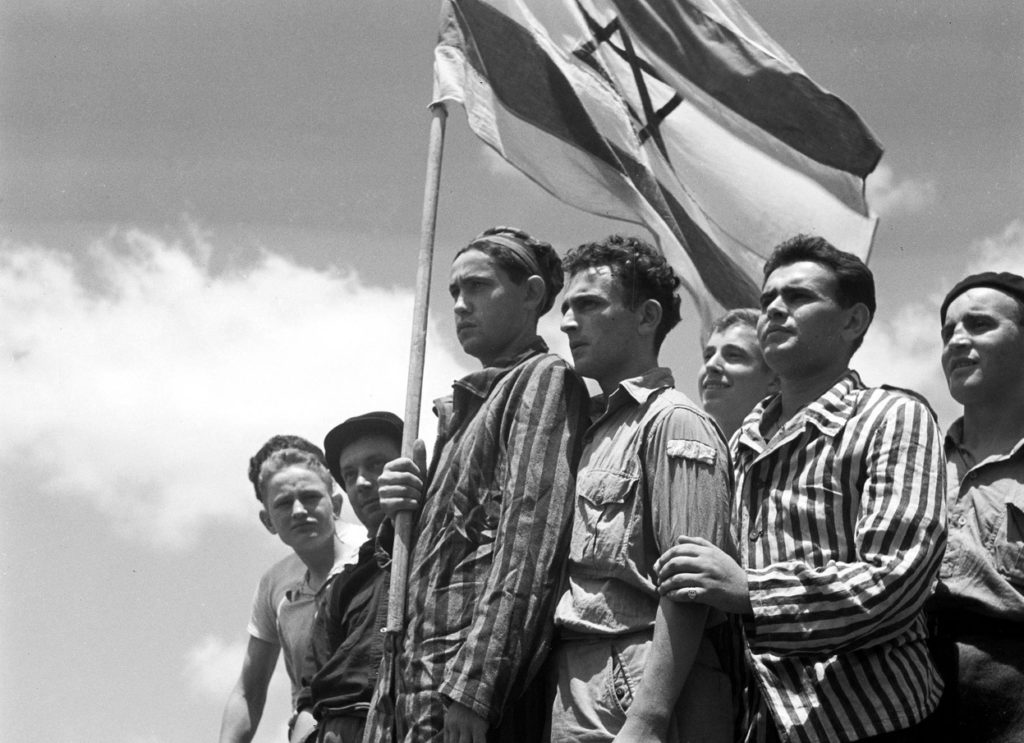
I served my years proudly, but not without injury. Even though I was injured badly enough and was set for early release as I could no longer serve my position as a combat engineer, I fought even harder to remain. Serving my country and my people was not something I was about to give up. I won. I served our my remaining years and was discharged, making the rank of sergeant.
The years after my service were spent working hard. Unlike most young Israelis who took the opportunity to travel and see the world following their service, my goal was to get into university stateside and that meant working long hard hours. Saving shekels for an American college to paid for in American dollars seemed almost unattainable. But if lying up in an army rehabilitation hospital for months didn’t sway me from completing my service, this certainly wouldn’t keep me from fulfilling my goal.
Fast forward years, following completion of my studies, the opening of my first design studio, and the successes tied to that, I began my television career as a design expert for Canada’s longest running and most watched lifestyle show, Cityline. Being on air changed my life completely. Eight years later, being syndicated in the US reaching tens of millions of homes, I am still grateful and humbled by every new experience. I was even able to travel home with the show in 2013 to film Israel through my eyes, bringing the country to millions upon millions of people who only knew or saw Israel through the headlines. But Israel is so much more. The Israel that I knew and that I fought for was the “Israel beyond the headlines.”

In 2014, Israel faces yet another war: Operation Protective Edge. Jews all over the world held their breath as tensions rose. And when Israel was, once again, pushed to the brink, it happened.
The beginning of the war introduced me for the first time as a public figure, who was openly and proudly Israeli, to the backlash of anti-Israel and antisemitic vitriol.
Social media, a platform that had always been my friend, was flooded with photos of me spliced with Hitler. Accounts that had their locations both in Toronto and all over the world had threatened me with harm at the very least, stating that they knew where our studios were. At the very worst, I was threatened with death. I went on the defensive, answering each and every message with facts regarding what was happening, believing that perhaps these people simply didn’t have the correct information. I lost weeks of my life engaging this way, believing that I could show these misguided individuals their errors.
Perhaps they were ill-informed and once I provided them with information, they’d surely come to their senses.
I was naive. It wasn’t about facts. It wasn’t about information. It wasn’t about anything other than the oldest racism in the world: antisemitism.
It wasn’t about facts. It wasn’t about information. It wasn’t about anything other than the oldest racism in the world: antisemitism.
But this was different. I had seen antisemitism growing up. Of course, I had. I laid a makeshift headstone at Auschwitz when I was 16 in memory of my grandparents who were gassed and killed at that very site. I stood at the ovens, peering in, seeing the ashes that still remained. I visited Majdanek, one of the only camps left as is since the day that the Russians liberated it, to be a standing testimony to antisemitism. I cried at the child-size striped shirt that was thrown on the ground, imagining one of two scenarios: the shirt being removed as the child ran to freedom or the more likely scenario of it being removed from a child’s body that could no longer endure what antisemitism had done to it.
The horrors of the Holocaust are still too real for many. This has created a need for antisemitism to disguise itself as something less abhorrent to the masses, while it remains just as vile to Jews: anti-Zionism.
The great Martin Luther King, Jr. is quoted as saying, “When people criticize Zionists, they mean Jews. You’re talking anti-Semitism.”
And, of course, he was correct.
I began to realize that a word that I had celebrated my entire life, which by definition simply means the right of the Jewish people to self-determination in our ancestral homeland, was being highjacked by those who wish to see us destroyed. They skew the definition into something hateful and colonialist that has nothing to do with our inherent right.
And we, the Jewish people, have allowed it.
It has somehow become acceptable to be antisemitic if you coin it anti-zionist. But denying the Jewish people that right, is of course, antisemitic.
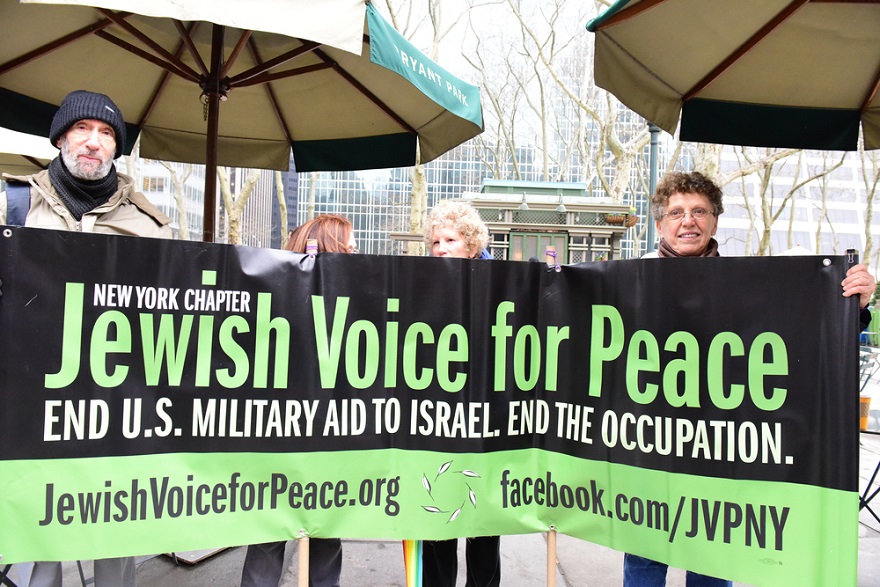
Two years ago, a dear friend of mine whom today I call my brother, Hen Mazzig, an Israeli advocate and writer, came to Toronto to speak with me at an event. Hen began speaking for Israel years before me so he had a thing or two to teach me.
As we sat and began to figure out what we’d talk about, he brought up the term “shtetl mentality.” I am not a Yiddish speaker and had no idea to what he was referring.
He explained to me that this was a term coined to define what Jews in Europe had done to survive the atrocities of European antisemitism from the Spanish inquisition onwards. This is the idea that if the climate against Jews becomes heated as it has repeatedly throughout history, we should keep our heads down and tow the proverbial line of our host countries in hopes that it too shall pass.
Hide your Magen David, don’t wear your Hamsah, don’t speak Hebrew in public, don’t were a kippah, and heaven forbid, don’t (as I did) put a Hebrew sign in the back of your car, 3 times. (Although the glass repair company loved me for it.)
Do nothing that shows the pride you have for your people or your country. And by the way, this only applies to Israel. The nation-state of the Jews. So now, dear friends, is that not abhorrent antisemitism?
As I look at Canada’s southern neighbor, I see it. The birth of a new movement, predominantly rooted in the Jewish millennial generation who see the world through perceived rose-colored glasses. I won’t call them fringe because I do believe at heart that they want a world where peace and harmony reign. But I will call them misguided. They claim to be groups rooted in Judaism but detest Zionism, our right to self-determination.
They believe in Israel as long as it is not the Jewish state because that is racism. Not China, not Japan, not France, not Sweden, Not Finland, not Scotland, not Ireland, not Spain, not Greece, not Italy, not Jordan, not Syria, not Pakistan, not India, and the list goes on of all nation-states representing their indigenous peoples.
Israel, the tiny nation-state of the Jews, is the issue.
Israel, the tiny nation-state of the Jews, is the issue.
Pay no attention to the fact that 20%, approximately 1.8 million Israelis are not Jewish. Pay no attention that the third-largest party in the Knesset is the Joint List, a party of Arab Members of Knesset who continually call for Israel’s destruction, but are paid by my tax dollars, as all democratically-elected officials are. Pay no attention that Arab enlistment in the IDF is at an all-time high because Arab-Israeli pride in their nationality is at an all-time high. Pay no attention to all those facts because they hinder the narrative of these groups. And when one digs a little deeper into who these Jewish groups are, there are frightening connections to people like Women’s March organizer Linda Sarsour. A few weeks ago, Sarsour spoke at a conference and told those who sat before her not to “humanize” Israelis, while she keeps close ties with one of America’s most vile antisemites, Louis Farrakhan, whose words I refuse to quote on Yom Kippur.
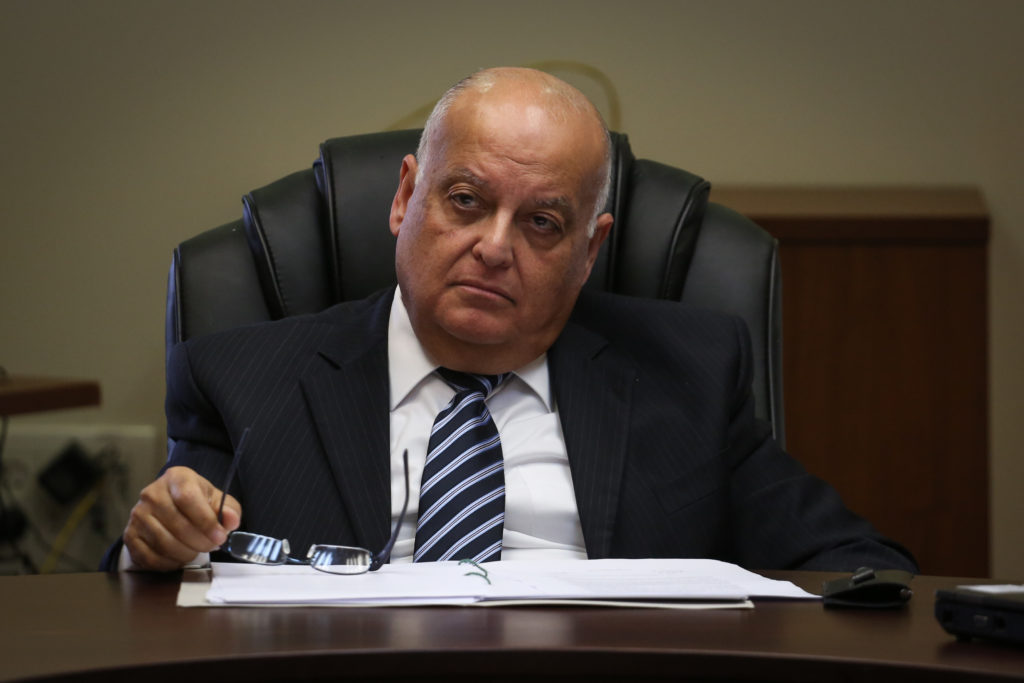
A state similar in size to Rhode Island, leading the world in medicine, agriculture, water desalinization, cybersecurity, science and high-tech to name a few. Who was the first nation to help those in need in Haiti after the earthquake, or in Japan, Thailand, Mexico, and New Orleans after their natural disasters? It was, of course, Israel.
It is this misguidance that plagues these organizations. Apologizing for the deeds of those with whom they align as a show of solidarity in a fight they believe is for the greater good.
An example: a few days ago, a man who I knew personally and whose political views could not be more different than my own, Ari Fuld, an American-Israeli who spent his life fighting for the Jewish people and the Jewish state, was murdered by a Palestinian terrorist in Gush Etzion while grocery shopping.
Ari and I saw the world very differently. His life was embedded in his religion. He was proud of that.
Myself–an LGBT, secular, Sephardic Israeli who championed the Pride March in Jerusalem–was not his regular go-to friend, shall we say?
But as is Israel and the Jewish people. When you put the two of us in a room or on a social media line together, there are fireworks. Never did that stop him from sending me a WhatsApp message saying, “My brother, know, I love you. When you’re next in Jerusalem, let’s have coffee.”
Then I made the mistake of opening Twitter. Daniel Solomon, who wrote for a prominent American-Jewish newspaper that has a long and complicated history with Israel, wrote as a reply to the announcement of Ari’s death, not hours after his body was laid to rest:
“I think it shows a charmed, modern naivete, that people who occupy the lands of others expect to walk around unmolested. Hard to feel much sympathy when this happens to settlers, Sorry.”
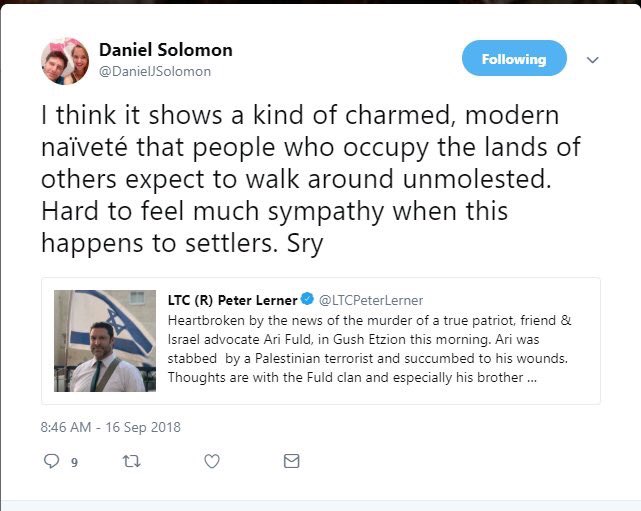
To Mr. Solomon and to all the Jewish groups I alluded to above, I pose the following question: what is the difference between the Jewish people of 2018 as opposed to the Jewish people of Spain in 1492, or the Jews of Europe and North Africa during the pogroms, or the Jews of Europe in 1939-1945?
Look east to Israel. Our Home. Our refuge. Our security.
Now, Israel is not perfect. I can’t think of a country that is. The divide between orthodox Jewry in Israel and secular Jewry in North America is at an impasse. The funny thing is, within the borders of Israel, secular and orthodox Jews have found a way to coexist in relative calm. And while I appreciate that every Jew must look at Israel as his homeland, I’d argue that unless you live in the country, pay taxes, serve as we all do and adhere to all the requirements of citizenship, you cannot make decisions for us from your homes in Brooklyn, LA, or Toronto.
This is a dangerous time for the Jewish people. And those who are looking to harm and destroy us are paying attention and cashing in on that divide.
We must not forget, that Jews are much more than religion and all its factions. When I did my AncestryDNA and compared it to that of my friend in Gush Etzion, both read Jewish, and of course, religion doesn’t appear. We must concentrate on what makes us the same while celebrating the differences amongst us.
We must concentrate on what makes us the same while celebrating the differences amongst us
Across the Atlantic, Britain is facing an antisemitism, that I follow closely, as all of you should.
The Queen’s opposition leader, Jeremy Corbyn, has been exposed over the past months, in some of the worst antisemitism I’ve seen since 1930-32 in Germany. He spent the better part of a month pandering to his followers not to adopt the IHRA definition of antisemitism, the gold standard and the global standard, because it detests labling the founding of Israel a racist endeavor.
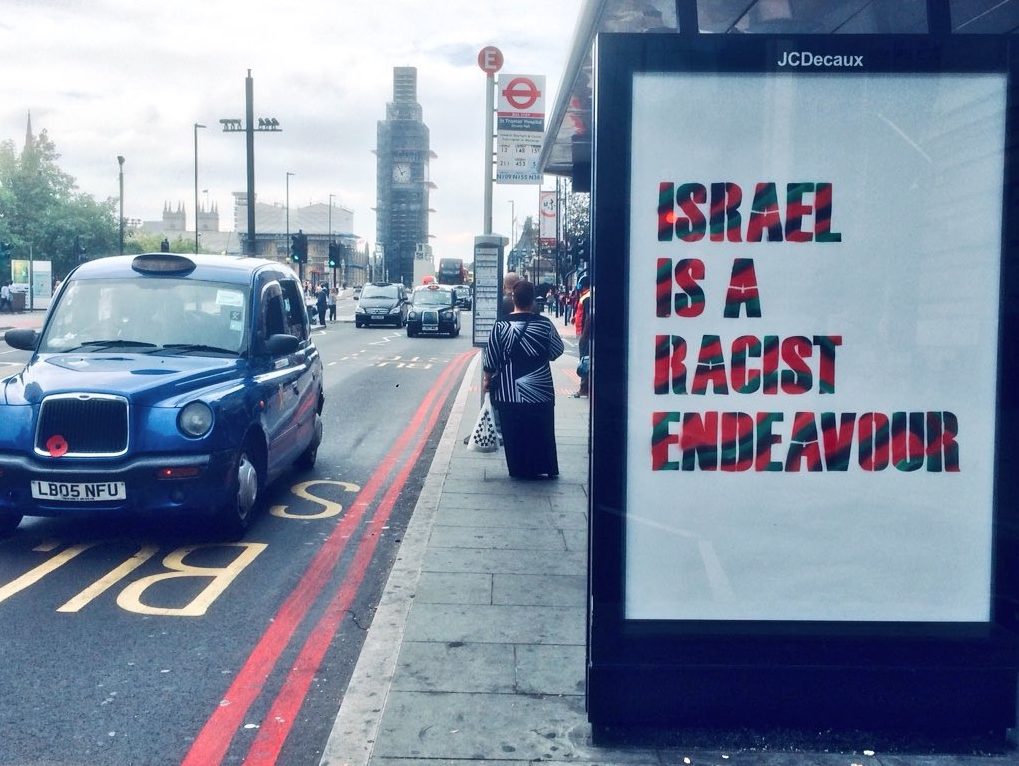
And when I once again fell into the abyss of reading his followers comments, I might as well have been reading Mein Kampf. The largest socialist movement in Europe has embraced antisemitism and anti-Israel hate to an extent that has seen 68 Rabbis, Jewish MPs, Lord Jonathan Sacks and public figures alike call on the Labour Movement to remove those found to be pandering antisemitism. Did that help? Two weeks ago a former London police officer shared with the Jewish Chronicle, one of London’s largest Jewish newspapers, that the party had hidden a dossier detailing antisemitic events within the party, so awful, they were to be brought to the police to be investigated for hate crimes. Was it forwarded for investigation? No. It was instead hidden by the Labour Party.
It became apparent to me that the day I turned in my uniform and looked to civilian life, was not the last service I owed my people. My nation. May country.
The existential threat we are now facing is much more complicated as it had seeped into a disenfranchised younger generation looking for a target at which to aim their frustrations.
I, as a public figure, could no longer remain silent. My silence was tantamount to irresponsibility.
I decided I needed to head into the “belly of the beast” as it were.
I’ve partnered with CAMERA on Campus, following a keynote I delivered at their international student conference in Boston, I will be taking two speaking tours this year. The first, in November, to England, Ireland, and Scotland, where, as I have mentioned, antisemitism is the byline of Labour Party leaders, with a shocking trickle-down effect.
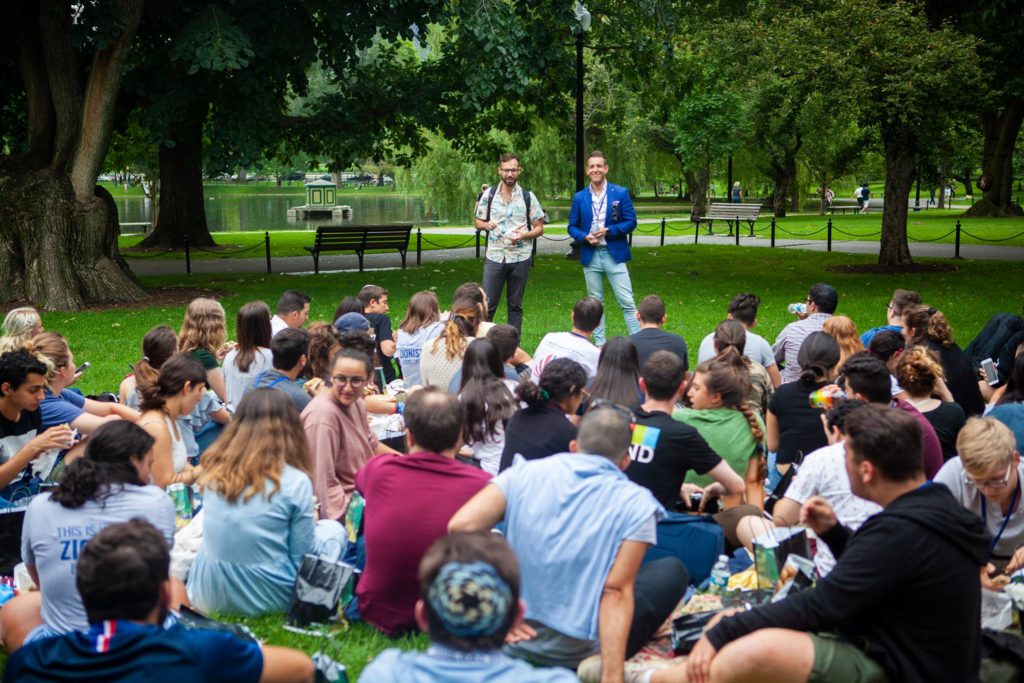
I will be appearing at universities across Great Britain in an attempt to help those who are fearful of attacks due to their Jewish identity and support for Israel, to find their voices and speak up, and the next in the Spring across the US & Canada to do the same.
When I was asked by the organization if I’m more comfortable speaking at universities known to be friendly to Israel and the Jewish people as opposed to those known for their hatred, I replied immediately. We cannot create change if we only work with like-minded people. So, my coming year is sure to be an interesting one.
And so dear friends, today, on Yom Kippur, as we look to the heavens and ask for forgiveness while looking ahead to the future, I look to you. We, the Jewish people, are at crossroads. More of the same? Or a future where antisemitism is fought at every turn. A world without our country is not a world to which we should ever want to return. Israel is the home of the Jewish people. All Jewish people. We can no longer sit quietly while the world embraces an old antisemitism rooted in new antisemitic tropes, namely antizionism, the right of the Jewish nation to self-determination.
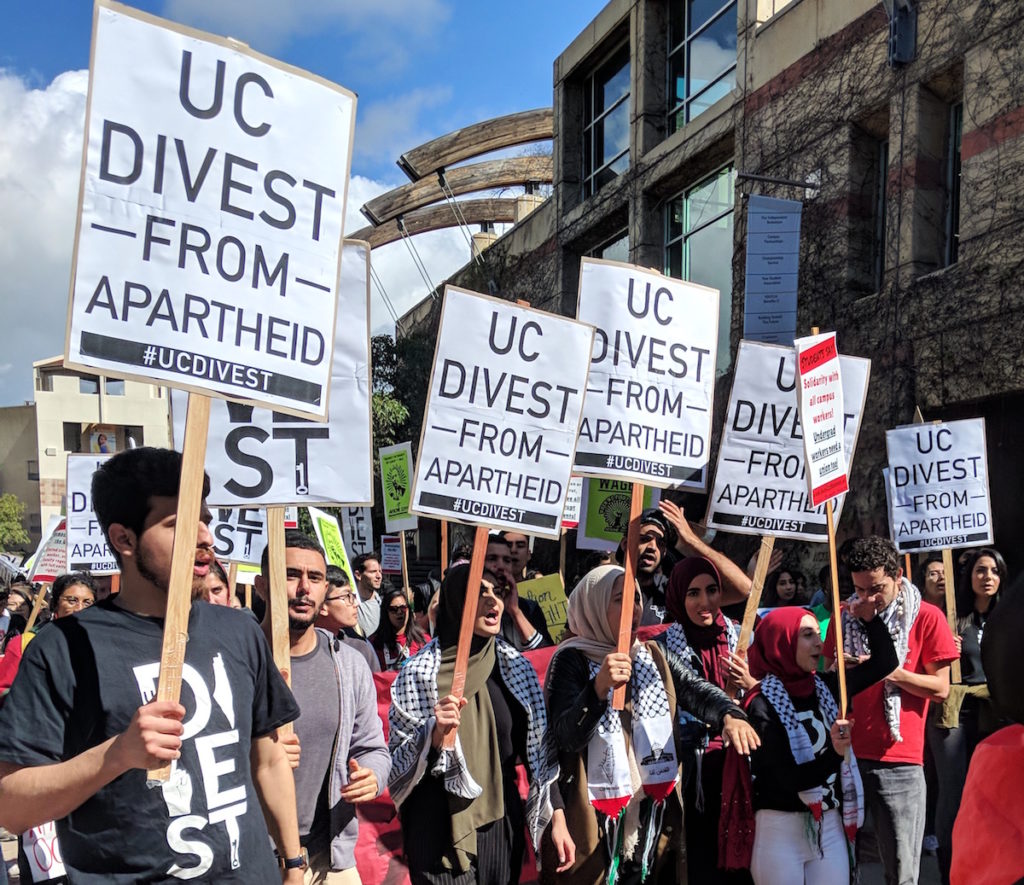
My resolution to my nation is to each of you individually. Together, we must not revert to the old shtetl mentality. We must open our eyes and have our voices heard. We must wake up.
We must not bow our heads in fear of being recognized as Jews, Israelis, or Zionists. Wear your Stars of David and Hamsot proudly. Speak in Hebrew if you so wish, wear a kippah if you so desire, and carry Israel’s flag in your minds and in your heart. It is after all my home, your home–our home.
Contributed by Shai DeLuca-Tamasi. Originally published in Times of Israel.
